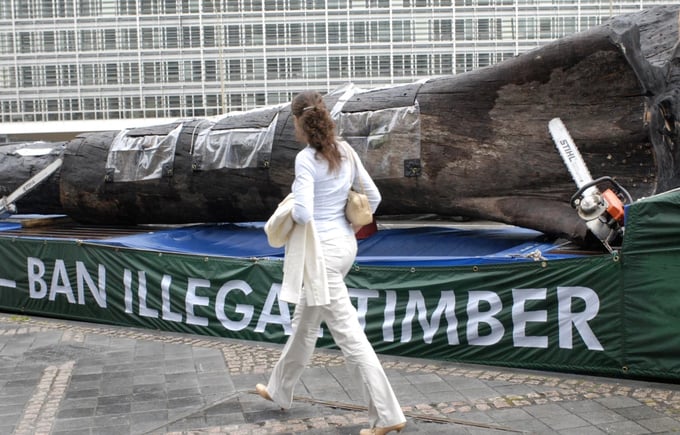November 26, 2025 | 13:42 GMT +7
November 26, 2025 | 13:42 GMT +7
Hotline: 0913.378.918
November 26, 2025 | 13:42 GMT +7
Hotline: 0913.378.918

A woman walks passed a 12-meter Amazon tree trunk placed in front of the European Union Council building by environmental activists in Brussels, July 2, 2008.
The European Union agreed to delay by a year the introduction of new rules to ban the sale of products that lead to massive deforestation, caving in to demands from several producer nations from across the globe and domestic opposition within the 27-nation bloc.
Officials said Wednesday that the EU member states, the EU parliament and the executive Commission reached an agreement in principle following weeks of haggling whether the initial rules would have to be watered down even further than the simple delay by one year. Originally, it was supposed to kick in this month.
The deforestation law is aimed at preserving forests on a global scale by only allowing forest-related products that are sustainable and do not involve the degradation of forests. It applies to things like cocoa, coffee, soy, cattle, palm oil, rubber, wood and products made from them. Deforestation is the second-biggest source of carbon emissions after fossil fuels.
The lead negotiator among the different EU institutions, Christine Schneider, called the delay to implement nature protection rules “a victory,” adding it would give foresters and farmers protection from “excessive bureaucracy.”
Environmentalists immediately criticized the move.
“With our planet’s forests destroyed further every day, we cannot afford delays to much-needed environmental protection laws like the EU’s anti-deforestation legislation,” said said Giulia Bondi of the Global Witness group. .
Officials from leading exporters of affected commodities — including Brazil, Indonesia and the Ivory Coast — fear the regulation could act as a trade barrier, hit small farmers and disrupt supply chains.
Under the deal, the rules are now scheduled to start Dec. 30, 2025, for large companies, and June 30, 2026, for small companies. The different EU institutions will still have to individually approve the deal but since they agreed on the measures, this is likely to be a formality.
In offering to delay the regulation by a year, the EU Commission has said it heeded the complaints of several global partners about their state of preparedness for the rules.
Some EU governments, including in Austria and Germany, have also sought to water down the regulation or delay its introduction.
With the delay, some governments sought to add more measures that would weaken the original rules and allow for more exemptions. Even if that was not agreed to in the current deal, Schneider said that the commission had “committed itself to updating the Deforestation Law within a year.”
Greenpeace has said that the extension would condemn the world’s forests to another year of destruction. It noted a U.N. finding that an area of forest about the size of Portugal is cut down worldwide each year.
“Instead of rolling back its environmental agenda, the EU needs to keep its commitments and show leadership to tackle the climate emergency,” said Bondi.
(AP)

(VAN) A new study reveals how the simultaneous effects of ocean acidification, salinity and loss of oxygen are making the world more fragile.

(VAN) Hopes are growing that the creation of the first 3D turkey gut model could be a turning point in the battle against the virulent blackhead disease.

(VAN) Tyson, America’s biggest meat supplier, plans to shutter one of its largest beef processing plants as the industry continues to struggle with low cattle supplies and political pressure from Washington.

(VAN) New FAO study shows how digital solutions are empowering farmers and fishers to prevent losses and build resilient agrifood systems.

(VAN) Brazil's COP30 presidency pushed through a compromise climate deal on Saturday that would boost finance for poor nations coping with global warming but that omitted any mention of the fossil fuels driving it.

(VAN) Poultry farmers in the UK have been warned that they could face one of the worst winters yet for bird flu.

(VAN) Prices of main-crop paddy have risen sharply, with jasmine rice hitting 16,100 baht per tonne — the highest level in years.